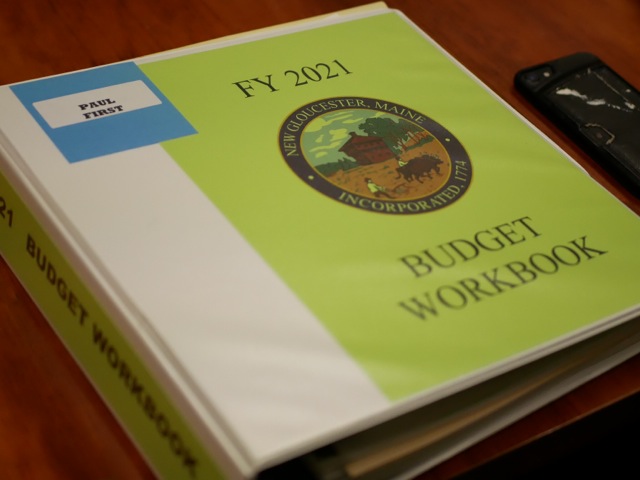
| Joanne Cole, NGX |
Gathering in the library’s meeting room because the meetinghouse was spoken for, the select board held its final budget workshop on February 13. Among other difficult decisions, the board recommended eliminating the assistant librarian position and reducing the library’s open hours from 40 to 30 per week. Interim town manager Paul First cautioned that the library cuts would be “a tough sell at town meeting.” Board chair Linda Chase agreed that community pushback was likely but said, “There’s no other place to cut.”
The town budget, a work in progress, now moves to the budget committee, a citizens’ advisory group. The committee is scheduled to meet Monday February 24 at 6 pm at the meetinghouse. Further meetings are currently scheduled for February 25 and 27, and a public hearing for Thursday March 5, but dates may change as the process goes forward.
At issue is a draft FY21 town budget that budget advisor and former selectman Steven Libby told the board on January 27 reflects an increase of 14 percent over the prior year budget. At that workshop, Libby said increases in revenue and growth this budget cycle are insufficient to keep pace with increases in fixed costs like insurance, benefits, and payroll, and that’s “before we even look at public works, fire/rescue, and capital” items.
Since the January 27 workshop, the board has met twice more in search of possible cuts, savings, and revenues. In addition to cutting library staff and hours, on February 13 the board decided to reduce the code enforcement officer position from fulltime-salaried to 36 hours, for a projected savings of $6200, and made a parallel reduction in status and hours to the parks and recreation director position, saving an estimated $6900. The changes preserve the positions’ benefits.
The board rejected a similar change from fulltime-salaried to 36 hours for the finance director position. Calling the finance director role “one of the most critical positions,” interim manager Paul First added that it would be essential in helping a new town manager “get up to speed with the tools they need to do the job.”
The board also firmed up a borrowing and spending package to fund the $700,000+ Stevens Brook dam and culvert project on Gloucester Hill Road. They took Chestnut Common off the paving plan to save $36,000 and agreed to tap $10,000 in Pineland TIF funds to help with code enforcement and town planner lines. Wrapping up, they imposed an additional 1 percent reduction across some ten budget lines, a hoped-for further $28,800 in savings. New bottom-line budget figures were not publicly shared.
But it was cuts to the library budget that proved to be the evening’s most contentious topic. Previously, the board had discussed reducing the assistant librarian position from its current 36 hours to 24. That, along with cutting library hours by 10 each week, offered an estimated $27,000 in savings. Now the board was looking at eliminating the assistant position altogether, to save a further $20,000. Manager Paul First cautioned, “You’ll see a significant cut to services,” in part because the assistant takes over during the library director’s vacation time, several weeks earned over decades of service. Board members wondered whether volunteers could fill the gap, or the library could simply be closed when the director was off.
Interim manager First urged the board to reduce rather than eliminate the assistant’s hours and take a year to assess the impact and explore alternatives. Board chair Linda Chase responded, “There’s no other place to cut.” Member Karen Gilles added, “I don’t want to cut it. But tell us where to find the money.” A closely divided board agreed.
With the full $47,000 in library cuts penciled in the ledger, Joe Davis said, “Now I’d like to cut $47,000 out of Parks and Rec.” Arguing for equal pain across the two departments, Davis commented that with school budgets, “Sports are the first thing you cut.” Interim manager First noted that parks and recreation “does produce revenue,” some $29,000 as of January and perhaps $55,000 over the full year. The board declined to impose further cuts to parks and recreation.
The February 13 budget adjustments join earlier decisions that had had the net effect of taking $105,000 off the initial January budget, Sharlene Myers of the town office told the board. Increasing employee contributions to health insurance, reducing the fire/rescue budget for uniforms, eliminating a regular public works position while hiring a deputy director and a mechanic as planned, increasing rec program fees, and moving to a single transfer station sticker with a $10 fee for everyone, were among the prior changes.
The process now moves to the budget committee, a citizens’ advisory group that can make its own recommendations to the select board. According to budget committee chair Peter Bragdon, if the budget committee’s recommendations differ from those of the select board, the select board has three options: they can accept the committee’s recommendations and send them to voters; they can disregard the budget committee’s recommendations and go with the board’s own; or they can present both options and let voters choose. Voters at town meeting can only reduce or accept amounts presented on the warrant, Bragdon said; they cannot increase them.
Between now and then, the ultimate impact on taxpayers will depend not only on finalized town budget figures and recommendations but also on the MSAD 15 and Cumberland County budgets and the state’s revenue sharing contribution, among other variables.
Videos of the select board’s budget workshops to date are available here. Budget committee meetings will be broadcast live on NGTV and also be archived on the town website.






